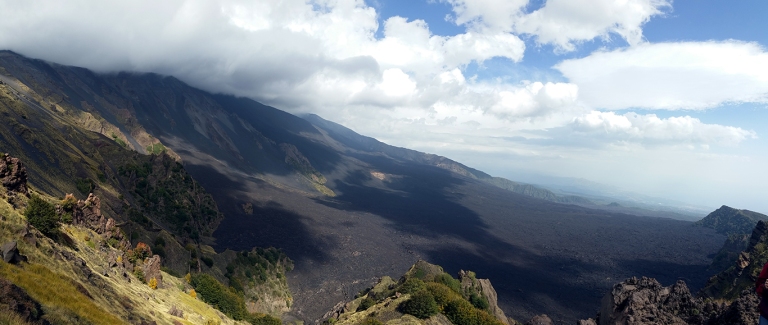Why would anybody choose to live next to a towering mountain that intermittently spews out molten rock?
Text: Calvin Shackleton
There must be a good reason, since volcanically active regions and dense populations often coincide.
Living close to a volcano is dangerous. Explosive eruptions of molten rock and pyroclastic hot ash, expulsion of flowing magma, emissions of suffocating carbon dioxide clouds, and deep-seated earthquakes are just some of the threats that people face. Volcanos are even responsible for more surprising risks to health; Mount Etna in eastern Sicily has been linked to increased risk of Thyroid cancer.

Volcanic forelands may seem barren when first created, like Valle del Bove on the eastern flank of Mt. Etna. Life soon takes over. Photo: C. Shackleton/CAGE
The soils near volcanos are extremely nutrient rich, as the very same pyroclastic flows and lava expulsions that pose such a hazard are packed with nutrients and are readily weathered. Inhabitants of Sicily are treated to healthy crop yields, a clear indication of which is seen by driving around the island and observing fields upon fields of olive trees and grape vines.
Volcanos also provide an energy source, and many communities in Iceland and New Zealand harness geothermal power through the generation of steam to drive power turbines and generate electricity. Also, hot springs, geysers and historical fascination attract huge amounts of tourists every year to communities near volcanos, providing jobs and supporting local economy.
So, why live near a volcano? It turns out there are many reasons, you just have to be brave enough to find out.
The blogpost was created at a field trip to Sicily in the fall of 2016. The field trip was a part of Trainee School in Arctic Marine Geology and Geophysics, and was partly funded by ResClim.

Calvin Shackleton is PhD candidate in glaciology at CAGE Centre for Arctic Gas Hydrate, Environment and Climate ( CAGE) at UiT The Arctic University of Norway.
